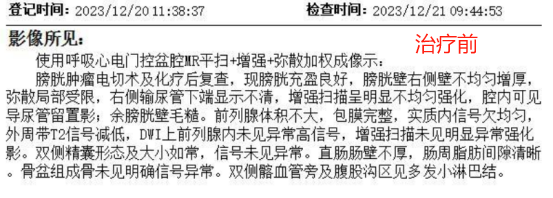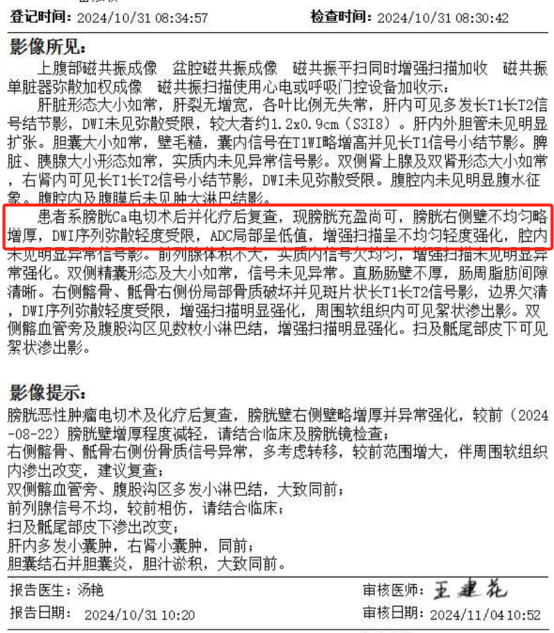Patient, male, 48 years old. Diagnosis: bladder malignant tumor
Patient, male, 48 years old. Diagnosis: More than 6 years since the diagnosis of bladder malignant tumor and more than 1 year since carbon-ion radiotherapy.
Medical history:
In July 2018, the patient was found to have a bladder mass (on the left wall) during a physical examination. On July 27, 2018, the patient visited Qinghai Red Cross Hospital and underwent transurethral resection of bladder tumor (TURBT). Postoperative pathological examination showed that the bladder tumor was consistent with invasive high-grade urothelial carcinoma, and no invasion of the muscular layer was found. Immunohistochemical results showed: CK20(+), CK5/6(-), CK7(+), GATA-3(+), P53(+), P63(+), S-100(-), Ki67(index 50). After the operation, the patient received intravesical instillation chemotherapy (gemcitabine 0.1g once a week, once a month after 2 months) for 1 year.
On January 20, 2020, a follow-up abdominal CT showed a cauliflower-like mass on the right wall of the bladder, suggesting possible recurrence of the disease. Therefore, the patient underwent TURBT again. Postoperative pathological examination showed that the bladder tumor was consistent with high-grade urothelial carcinoma, and no tumor invasion of the intrinsic muscular layer was found. Immunohistochemical results showed: CK20(partially +), CK5/6(partially +), CK7(+), GATA-3(+), Ki67(index 20%), P53(+), P63(-). After the operation, the patient received regular intravesical instillation of "BCG 120mg once a week, once a month after 2 months" for 19 times.
In July 2021, a follow-up abdominal CT showed recurrence again. On July 28, 2021, the patient underwent TURBT. After the operation, the patient received intravesical instillation chemotherapy (gemcitabine 0.1g once a week, 4 times). Then, bladder stones occurred, and the treatment was changed to "BCG 120mg once a month". The patient was regularly followed up, and the condition was stable.
In May 2023, the patient visited Qinghai Red Cross Hospital again. A follow-up abdominal CT showed tumor recurrence, and the patient underwent TURBT. Pathological examination showed that the bladder tumor was consistent with high-grade invasive urothelial carcinoma, with squamous differentiation and a small amount of necrosis; there were many neutrophil and lymphocyte infiltrations around the tumor; the tumor invaded the muscular layer, and no obvious tumor thrombus was found in the blood vessels. Immunohistochemical results showed: CD44(+), CK20(partially +), CK7(partially +), Desmin(positive in smooth muscle), GATA-3(partially +), Ki67(index 80%), P53(abnormal overexpression), P63(+), S-100(-), CK5/6(+). After the operation, the patient received "mitomycin 40mg once a week" for 8 times, followed by "gemcitabine 0.1g" instillation therapy for 2 times. The patient experienced lower abdominal pain and discomfort after each instillation, which resolved after 2-3 days.
On September 4, 2023, the patient visited the Affiliated Hospital of Qinghai University. After completing relevant examinations, the patient received 4 cycles of GP regimen (gemcitabine 1.6g on days 1 and 8 + cisplatin 40mg on days 2 and 3) chemotherapy combined with "toripalimab 240mg" treatment on September 14, 2023, October 11, 2023, November 4, 2023, and November 25, 2023. On December 18, 2023, the patient visited our hospital. After consultation by the heavy-ion center, the patient received carbon-ion radiotherapy for bladder cancer on December 29, 2023. The dose of PTV1 was 36Gy (RBE)/12fx; the dose of PTV2 was 48Gy (RBE)/12fx. Then, the field was reduced to boost the right bladder wall: PTV2: 16Gy (RBE)/4fx. On January 4, 2024, the patient received NK cell immunotherapy once. After receiving "toripalimab injection (240mg)" immunotherapy once on January 6, 2024, the patient was discharged.
In March 2024, the patient developed pain in the sacrococcygeal region, with an NRS score of 4. After a comprehensive evaluation of the condition, disease progression was considered. On March 17, 2024, and April 7, 2024, the patient received 2 cycles of GP regimen (chemotherapy drugs: gemcitabine 1.8g on days 1 and 8 + cisplatin 30mg on days 1-4) chemotherapy combined with "toripalimab injection (240mg) intravenous drip" immunotherapy. On March 27, 2024, and March 29, 2024, the patient received CIK cell immunotherapy once. After consultation by the heavy-ion center, on March 20, 2024, the patient received carbon-ion radiotherapy for pelvic lymph node metastasis and sacral metastasis of bladder cancer, with a dose of 36Gy (RBE)/12fx, 3.0Gy (RBE)/fx, and then a boost dose of 28Gy (RBE)/7fx, 4.0Gy (RBE)/fx after field reduction.
On April 24, 2024, the patient visited our hospital again. After completing relevant examinations, it was found that the condition still progressed. Then, on April 29, 2024, May 15, 2024, May 29, 2024, June 11, 2024, June 27, 2024, July 13, 2024, July 26, 2024, August 10, 2024, August 24, 2024, September 14, 2024, September 30, 2024, October 14, 2024, and October 31, 2024, the patient received 13 cycles of "toripalimab 240mg + vedicitumab 120mg" immunotherapy. During this period, the patient received CIK cell immunotherapy and NK cell immunotherapy. A follow-up on October 30, 2024, showed: Pelvic plain + enhanced MRI: Abnormal bone marrow signals in the right ilium and the right part of the sacrum, most likely metastases, with an increased range compared with the previous examination. Chest plain CT: Several small nodular lesions in the lungs and subpleurally, with some nodules larger than those in the previous examination (August 22, 2024), most likely metastases.
On November 22, 2024, the patient was admitted to the hospital for further examinations and tests. After a comprehensive evaluation of the condition, on November 30, 2024, the patient received a subcutaneous injection of denosumab 120mg once. On November 23, 2024, and December 14, 2024, the patient received 2 cycles of chemotherapy combined with immunotherapy: albumin-bound paclitaxel 400mg intravenous drip every 3 weeks and tislelizumab injection (200mg) intravenous drip every 3 weeks. After consultation by the heavy-ion center, carbon-ion radiotherapy for pulmonary metastases of bladder cancer was started on December 5, 2024, with a prescribed dose of 70 Gy(RBE)/14F.
Treatment plan:
On December 29, 2023, the patient was given carbon-ion radiotherapy for bladder cancer. The dose of PTV1 was 36Gy (RBE)/12fx; the dose of PTV2 was 48Gy (RBE)/12fx. Then, the field was reduced to boost the right bladder wall: PTV2: 16Gy (RBE)/4fx. Synchronously: On January 4, 2024, the patient was given NK cell immunotherapy once. On January 6, 2024, the patient was given immunotherapy with "Toripalimab Injection (240 mg)" once.
Therapeutic effect:




